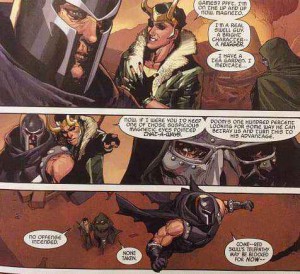One of the better things about this year’s major Marvel event – the Avengers/X-Men: Axis storyline – has been the central role played by Magneto in the whole, vast business.
It has afforded the Master of Magnetism better characterization and focus than he’d had in a long while and has served to make him more interesting than I’ve found him for years.
Scott Summers may have somewhat ousted Magneto from the iconic position of chief Mutant saviour-figure in the contemporary tapestry of the X-Men mythology, but the way Magneto has been so central to this Axis event may be serving as something of a restorative act and imparting the longstanding Magneto mythology with some new life. I hadn’t even been keeping up with the Magneto solo series prior to this, despite having read the first three issues earlier in the year.
I haven’t been a huge fan of Magneto as written in recent years; or as currently drawn (Gabriel Hernandez Walta’s art in the Magneto series doesn’t do it for me; though it may be an acquired taste) – there’s something really off-putting about how he looks these days when not helmeted – though he was in the old days by far my favourite comic-book character.
The Magneto monthly series has been decidedly bleak in both tone and content from the very beginning, but the ‘March to Axis’ and Magneto #10 was a particularly grim affair. Any interaction between Magneto and the Red Skull is automatically fascinating to me, due to the inherent, deep-seated dynamics of Schmidt, the real-life German Nazi supervillain taunting and provoking Magneto, the forever embittered Holocaust survivor and one-time ‘Saviour of Mutantkind’.
That early page in #10 featuring Quicksilver, Crystal and Luna Maximoff along with Wanda and Vision in Magneto’s memories played to the nostalgist in me, sending me back to my formative era of reading X-Men and Avengers comics (Blood Ties in particular).
That whole issue, with its subjective nightmare torture for Magneto, proves to be a timely and fascinating exploration of Magneto’s long-damaged psyche, reminding us of how complex and engaging a character he once was and can still be, with his own rich mythology. For a long-time Magneto fan who’s been struggling to enjoy the character in recent years, #10 was something of a refreshing experience and may draw me back to the title on a more regular basis again.
This entire issue, all taking place inside Magneto’s tortured mind and memories is genuinely nightmarish and unsettling, from reliving the death of his daughter Anya to being chased by Nazi dinosaurs – I know that sounds ridiculous, but in the context of the nightmare it genuinely is unsettling.
His experience through #11 is a little less engaging, but it creates the key twist in the story; troubled by Rogue’s observation that he, Magneto, is no different to the Red Skull, Erik goes through some troubled soul-searching and self-pity, questioning whether there has been any worth to any of his actions over the years.
Freshly encouraged, however, by being shown the impact his actions have often had on the lives of ordinary mutants and coming to realise that he perhaps best serves his people as the villain and not the hero trying to do ‘right’, Magneto sets off to gather a squad of villains from all over the world in order to come to the aid of the beleaguered heroes in Genosha and defeat the Red Skull.
The final images of Magneto #11, showing the legion of ‘bad’ guys and girls arriving at Genosha is true fan-boy stuff, though in the good way; but what’s especially great about it is having Magneto be the central influence and driving force of the initiative and having these other famed villains of the Marvel Universe having to follow his lead somewhat (though Doom of course makes it clear he is unwilling to ‘follow’ Magneto, only to stand beside him).
With all the big-scale confrontations and concepts, overpopulated sequences and character-laden scenes that define the Axis event, it’s notable that the absolute high point of the entire Axis saga so far isn’t in any of that: but is in fact Uncanny Avengers #25 and the confrontation between Red Skull and Magneto.
For starters, this issue’s depiction of the Mutant concentration camps really visually and tonally brings home just what the nature of this atrocity and the Red Skull’s evil is. What Schmidt is doing plays right into the very core of who Magneto is and always has been as a character and right to the heart of Magneto’s worst fears.

The fact that all of this unfolds in the rain also helps to impart it a bleak atmosphere throughout, the grim surroundings almost certainly bringing to the fore old memories of the Holocaust for both characters. But the real fascination is in the Red Skull deliberately and callously taunting Magneto, knowing full well what drives the Master of Magnetism and everything that forged him in his tragic past as a victim-child of Nazi Germany. Schmidt revels in this, utterly remorseless. As he taunts Magnus more and more with each measured word and callous look, we can see Magneto’s blank, almost numb-looking face and we know the rage – a rage coloured by so much life experience – is building within him.
When Schmidt demands Magneto kneels – bows – to him (in that classic Dukat/Sisko way) and when Magneto complies, we know this is the lowest the once proud Erik Lensherr could possibly get: literally bowing to a monster of the Third Reich who is now intent on visiting a Holocaust upon Mutantkind. As a longstanding X-Men and Magneto enthusiast and natural sympathiser to the Mutant cause, something in my gut reacted, having to watch Magneto doing that. But of course moments later Magneto, with his powers newly restored to him, assaults the Red Skull.
The big “I am MAGNETO!” declaration on page 12 might look silly out of context, but in the context of the story works as a fairly meaningful moment. Magneto then proceeding to coldly and calmly murder the Red Skull is probably the highlight of this entire Axis business. The fact that he consciously chooses to do so without using his ‘filthy’ mutant powers, but by simply pounding Schmidt’s face repeatedly with his fist, is also a meaningful thematic touch.
Whatever the prevailing view is of the Axis event as a (vastly over-extended) whole, it has given us one of the classic Magneto moments in the character’s history (in my opinion), which isn’t something I’ve been expecting lately. The way he also casually uses his powers against Havok and his own daughter Wanda when they try to stop his act of vengeance was very reminiscent to me of old-school Magneto and was pleasing to read on that level.
That sight of the apparently dead Red Skull laying there in the rain with Magneto, Havok and Wanda standing over him is an effective one, while Rogue’s disapproving assessment that he (Magneto) is no different to Schmidt sets the guilt-ridden, self-doubting course of the rest of Magneto’s key part in the Axis saga.
Magnus’s slaughter of Schmidt may be, on a visceral level, up there with him ripping the adamantium from Wolverine’s body in 1993’s classic X-Men #25; that’s not to compare the Fatal Attractions storyline with today’s Axis event, of course (Fatal Attractions was something substantially better and altogether different), but is just a comment on that kind of violent, evocative, defining moment that an important character maybe has only two or three times in their comic-book history.

Meanwhile Magneto showing up at Doom’s lair and taking out the guards in Loki: Agent of Asgard #7 gives us yet another almost cinematic moment/reminder of classic Magneto cool, while the flashback sequences of Magneto, Charles and Gabrielle in Magneto #12 provide a timely link to cherished past stories and that rich history that should always inform how Magneto is being written, always be central to what he is about.
Whether the central role Magneto has played in the Axis storyline will translate to further center-stage action for the Master of Magnetism beyond this event remains to be seen. It also remains to be seen whether the Cullen Bunn written solo title is something that has longevity in it.
If it can retain the quality-level it has attained during the March to Axis, I would certainly be tempted to return to the title on a monthly basis.
As engaging as Magnus has been to read through Axis, it still isn’t the Magneto I loved from the Chris Claremont days, Mutant Genesis or Fatal Attractions; but it’s as close to that level of fascination as we’ve had for many years.





Well said!
Mags is my man! I adored that old man when I was growing up.